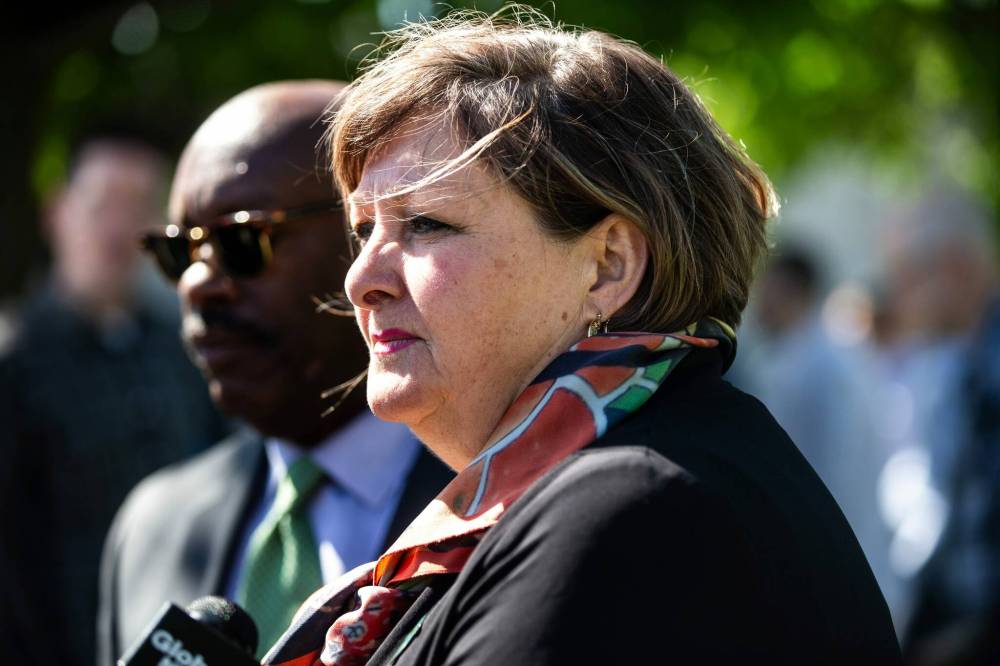The City of Winnipeg will soon convert 20 trucks to use propane fuel instead of gas or diesel, with a goal to reduce pollution and save money.
The city is seeking a supplier of propane, also known as compressed natural gas, for an alternative fuel pilot project. Some existing public works trucks will be altered to allow the testing.
“We will be converting light to medium pickup trucks,” city spokesman Adam Campbell wrote in an emailed statement. “We’re focusing on this class of vehicle for the pilot since it will be easier and cheaper to convert.”
Campbell said the goal is to run the pilot through all four seasons and that it will take up to two years.
Requests to interview a public works official about the pilot were not granted this week.
Campbell said the conversion of the vehicles can be done within a day by a certified installer, who would add a compressed natural gas propane tank to the vehicle and modify the engine fueling system to accept the alternative fuel.
Campbell said the city does not have an estimate of how much money it could save by making the change.
City officials estimate switching to propane fuel from gasoline would cut greenhouse-gas emissions by 25 per cent, though the pilot project would provide a better estimate. The city has set aside about $130,000 for the project, which would affect trucks at the public works/streets maintenance facility at 1220 Pacific Ave.
Coun. Janice Lukes, chairwoman of public works, said she supports the idea.
“I think it’s great to do a pilot … I think it’s good to look at all types of (alternative fuel) options. It’s actually very reasonable,” she said.

MIKAELA MACKENZIE / FREE PRESS FILES
Janice Lukes said the pilot will test how well propane works as a fuel source in winter months and initially appears much cheaper than buying new electric vehicles and charging stations to support them.
The Waverley West councillor said electric vehicles aren’t the only option that should be considered to cut emissions. She said the pilot will test how well propane works as a fuel source in winter months and initially appears much cheaper than buying new electric vehicles and charging stations to support them.
“(The cost) sounds really reasonable … It’s economical, and it’s still 25 per cent less GHGs,” Lukes said.
The contractor is expected to provide fuel at a station within 10 kilometres of 1220 Pacific, along with a system that tracks propane use per vehicle.
The RFP says a propane station could be provided at a city-owned property or a retail fueling station.
Campbell said the pilot could lead to broader use of propane to fuel city vehicles.
“Longer term, we hope to use the data from those vehicles to inform how propane could be used for larger classes of vehicles, such as larger pickup trucks (3/4 ton and up), sand-spreader vehicles, or ladder (aerial) trucks used by public works … There are some newer electric options available in the market for these vehicles, but they are very costly to purchase, and have limited availability,” he wrote.
Because the move is temporary, the city hopes propane can be supplied at an existing fueling station, Campbell noted.
The city expects to require enough fuel for 3,600 kilometres of travel per week. The length of the project will depend on how much funding city council approves.
The pilot project is expected to begin this fall.
joyanne.pursaga@freepress.mb.ca
X: @joyanne_pursaga

Joyanne Pursaga
Reporter
Joyanne is city hall reporter for the Winnipeg Free Press. A reporter since 2004, she began covering politics exclusively in 2012, writing on city hall and the Manitoba Legislature for the Winnipeg Sun before joining the Free Press in early 2020. Read more about Joyanne.
Every piece of reporting Joyanne produces is reviewed by an editing team before it is posted online or published in print — part of the Free Press‘s tradition, since 1872, of producing reliable independent journalism. Read more about Free Press’s history and mandate, and learn how our newsroom operates.
Our newsroom depends on a growing audience of readers to power our journalism. If you are not a paid reader, please consider becoming a subscriber.
Our newsroom depends on its audience of readers to power our journalism. Thank you for your support.